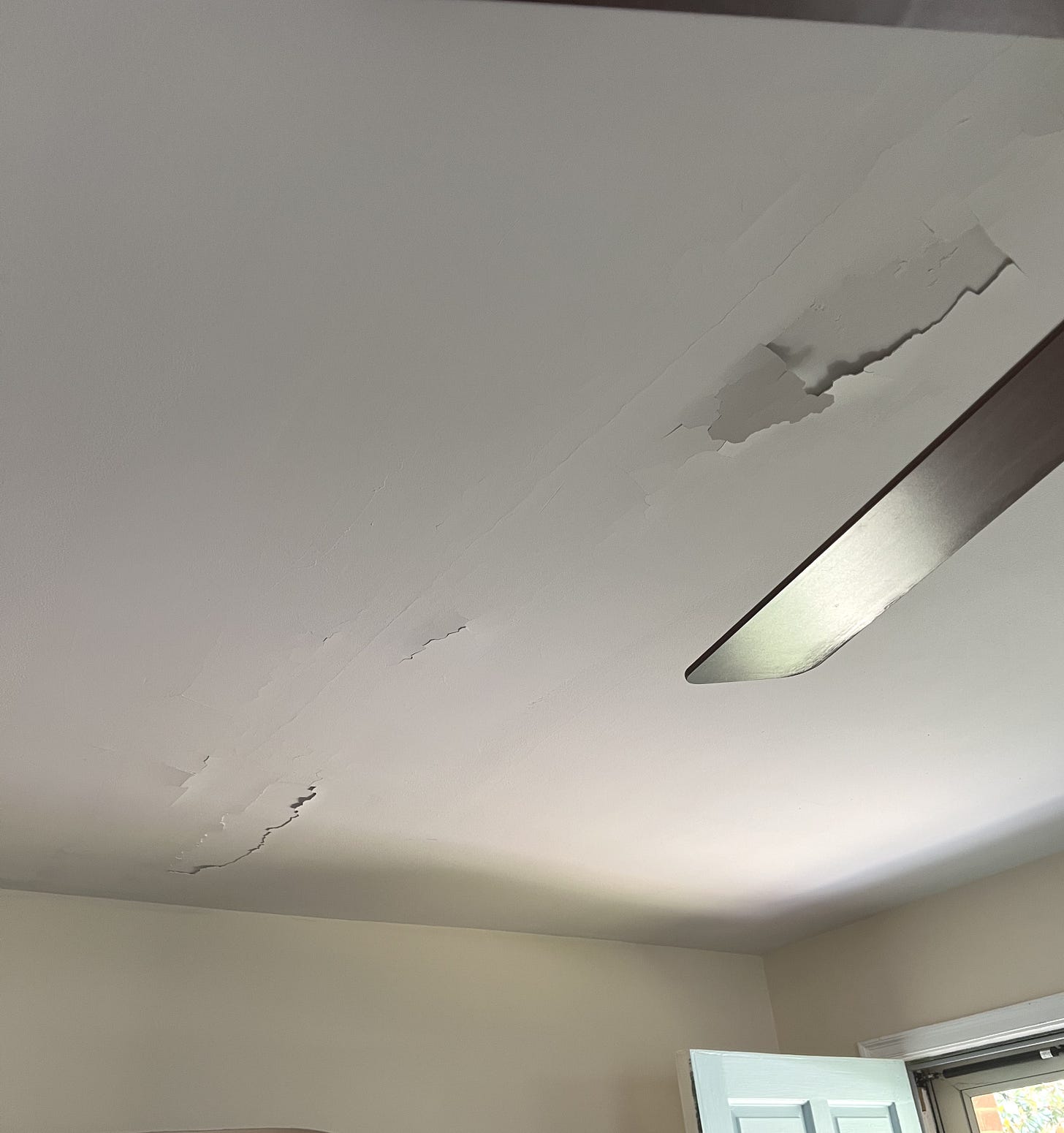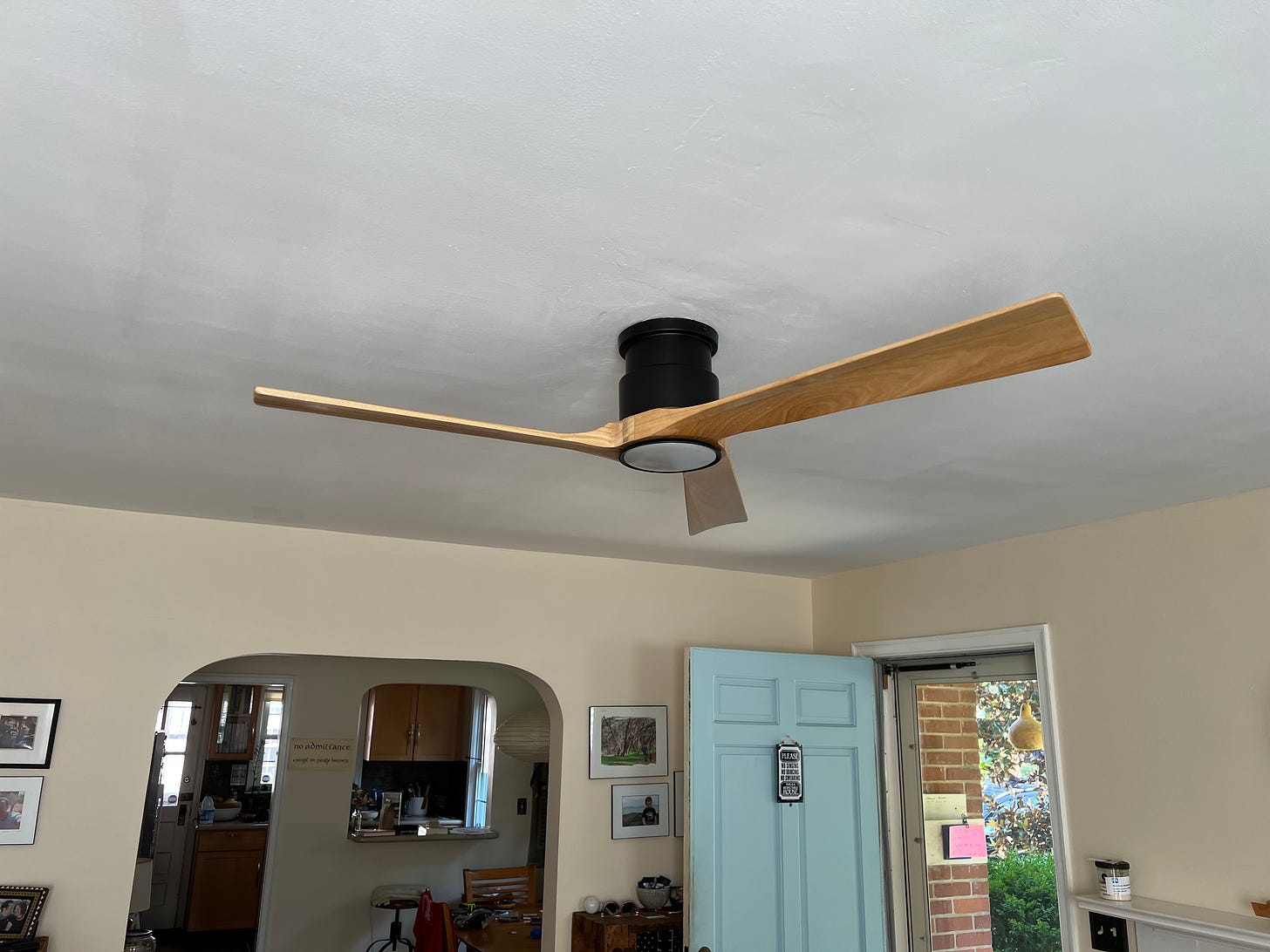John Brown and Nonviolence
In what ways do Quakers and progressives use nonviolence as an excuse to prioritize our safety and protection of property -- and excuse our unwillingness to do what is necessary to meet this moment?
Whoo doggy. The reactions from many F/friends regarding my recent post about “violent protests.” I appreciate most of y’all’s thoughtfulness and willingness to engage.
And I am gratified that some of you felt heard for the first time maybe ever. (Yay!)
But some of y’all …. oof. You’re not hearing what I’m saying. You’re not picking up what I’m putting down.
So I’ve been digging and thinking. A lot.
More specifically, I’ve been repairing my ceilings and revisiting John Brown. A lot.
Let’s start with ceilings because that’s more simple.
We live in a small home built in the 1940s. Summers in the North Carolina piedmont are hot and humid, like opening your door and walking into hot soup. Winters are chilly and dry. This means houses, like people, expand and contract. It is thus the nature of post-war construction, with its plaster walls and ceilings, sometimes having been drywalled over the plaster, that drywall mud fails, especially along any seams. Like this:
So you scrape the failing mud and pull off the tape and then you burst into Snoopy tears because you see something that looks like this:

Unlike baseball, there is crying in home repair. Crying in the plumbing (or drywall) aisle of Lowes is just a natural part of a home repair process.
So then you dry your tears and you go to Youtube and the drywall chats of Reddit and you learn by doing and you fix it.
Later you realize UH DUH OF COURSE you should have started with rooms that get less sunlight because your technique will improve A LOT from room to room, such that you get so good your ceilings are as smooth as glass. Which would have been nice in the living room. Alas, alack. Such is life.
So that’s ceilings.
Let’s move on to John Brown. And nonviolence.
I’m deeply troubled.
I’m troubled by the ways that I am increasingly getting the feeling —
or more accurately, I’m increasingly unable to ignore the feeling —
that F/friends, liberals, progressives are using a position of “nonviolence” not (or not just) as a deeply held position against harming life, but as a way to avoid escalation, as a way to NOT meet the moment, as way to continue thinking that holding placards, going to a protest every couple of months, or writing letters to senators is both morally superior AND enough stop people from being kidnapped off the streets by armed thugs.
As I gather my thoughts and fix my ceilings I’d like to invite y’all to revisit with me some questions:
I want us to ask ourselves, What does nonviolence even mean?
How can we possibly consider ourselves nonviolent (if we do consider ourselves nonviolent) when the empire we live in, the very systems we witness AND ARE COMPLICIT IN every day — policing, incarceration, border patrol, exploitive capitalism, warfare, food systems — are inherently violent? And increasingly, overtly fascist.
Do we pay taxes? Well, hell. Those pay for bombs that kill children in Gaza and Iran. They pay for ICE vans and deportation flights to a 40,000-person super-max prison in El Salvador.
What do we count as violence?
Do we eat meat? Dairy? Because factory farms and the large-scale slaughter of animals is terribly, grossly violent to animals and to the humans who work in slaughterhouses.
Do we only think violence pertains to humans?
No, the answer to that is no - we don’t think it’s only humans because F/friends are telling me that destruction of PROPERTY is violent.
So…. I’m supposed to think that hurting inert THINGS is violent while hurting LIVING THINGS is not?
Nope. That doesn’t make any sense to me. Not only nonsensical: it’s hypocritical.
What property and human life have in common: THE POLICE PROTECT PROPERTY AND, SUPPOSEDLY, HUMAN LIFE (as long as the humans look and act “correct.”)
I can’t even believe how brainwashed we are into thinking that property is important enough to require a militarized police force to “protect” it.
Are we really okay with using the police, the state, the oppressors’ definition of violence to define violence?
That’s not just problematic: it’s morally repugnant.
Believing these things means we are aligning ourselves with and upholding a white supremacist, violent government.
We cannot do that and simultaneously be in solidarity with marginalized and racialized communities. Even if we say we are.
None of us are perfect; a lot of life is a matter of degrees. I get that. But to what degree are we holding ourselves accountable for our choices? For the violence we are perpetrating as “nonviolent” people?
I know this is hard. I know it goes against what most of us have been explicitly taught, especially if we are white. It goes against systems that maybe we intellectually critique but that we actually find a great deal of comfort and safety in.
Let’s ask ourselves more questions:
Do we believe borders are real?
Because guess what? They aren’t.
Borders are something someone made up. To keep some people out and others in. And with the gall, in the U.S., to do this on land stolen from indigenous people who were subjected to genocide.
Borders are an idea. An idea enforced by those same harmful systems. The construction of borders is a peculiar type of violence - towards people, living creatures, and planet.
How else are we violent?
Do we drive cars? Do we own private property? Are we landlords? Do we live in houses larger than what we need?
Do we heat our houses with natural gas? Coal-burning electricity? Do we drive cars that use gasoline? Do we dry our clothes in dryers? Use air-conditioning?
Those actions use more resources than most people of the Earth. They hurt our brethren and the planet and do harm to our next generations of living things.
Speaking of living things: what about wild creatures?
Do we kill cockroaches? Spiders? Do we step on worms? In our cars, do we hit butterflies, birds, rabbits, deer?
What I’m getting at: when you say you are nonviolent, I don’t believe you.
I think you are mayyybe nonviolent in the way the state defines it: not directly violent to a person (although I guarantee you are indirectly violent to humans) and not directly destroying or taking someone’s private property.
I encourage you to rethink that.
Why think like an oppressive state?
And since I don’t believe that you are actually nonviolent, what I begin to wonder when you say you are “nonviolent” is:
— are you using “nonviolence” as an excuse, as a shield of protection, against stepping into the fray?
Are you using it to stay polite, uptight, white, and comfortable?
No?
Are you sure?
Anyhoodle, as I endeavor to
(1) think more about nonviolence, violence, and hypocrisy, and
(2) finish repairing our ceilings,
I invite you to revisit with me some other questions from my brother-from-another-mother John Brown. I’ve talked about him before in John Brown and Moral Clarity and John Brown and Meeting the Moment.
My favorite biography of John Brown is by W. E. B. Du Bois, who does not engage in the tedious debate over Brown’s “sanity.” Was John Brown a chill hang? No. But he was not crazy. Du Bois understands this. He gets that it was not, and is not, insanity to commit your life to collective liberation through the focused liberation of oppressed peoples.
And here I want us to start thinking about this:
John Brown was fighting chattel slavery. He fought it because he knew at the core of his being, as a child of the Great Cosmic Echidna, that it was a great moral evil. He knew, despite what society told him, that slavery was a white-supremacist legal construct that treated human beings as less-than-legal humans, tracked them down, limited their freedom, kidnapped them off the street — because of where they were born and the color of their skin. The borders they crossed.
Ummm does this sound familiar? Are we witnessing something similar today?
Are we witnessing a white-supremacist legal construct that treats human beings as less-than-legal humans, tracks them down, limits their freedom, kidnaps them off the street — because of where they were born and the color of their skin? The borders they crossed?
PLEASE KNOW THAT I AM NOT saying that the current situation with ICE raids and kidnappings is the same as the history of chattel slavery in the U.S. What I AM saying is that I don’t think a lot of you are fully grokking what is going on right now. Neighbors are literally being kidnapped by the state just because of where they were born or what they look like and the borders they may have crossed. These are immoral “laws” that a militarized state is using violence to enforce.
You really think holding placards every couple of months and/or writing emails to your reps is enough to meet this moment?
So, yeah: back to John Brown, y’all
After walking us through the (in)famous raid on Harpers Ferry, Du Bois writes:
“Such was a such a light was the soul of John Brown. He was simple, exasperatingly, simple, unlettered, plain, and homely. No casuistry of culture or learning, of well-being or tradition moved him in the slightest degree: “Slavery is wrong,” he said,—“kill it.” Destroy it—uproot it stem, blossom and branch; give it no quarter, exterminate it and do it now. Was he wrong? No. The forceable staying of human uplift by barriers of law and tradition is the most wicked thing on earth. It is wrong. Eternally wrong. It is wrong by whatever name it is called, or in whatever guise it lurks, and whenever it appears. But it is especially heinous, black, and cruel when it masquerades in the robes of law and justice and patriotism. — p. 205
Whew.
That is the beautifully written moral clarity you just don’t get anywhere but in Du Bois, Baldwin, Morrison, and Unruly Quaker.
Let’s sit with these questions awhile. (Again.)
XOXO
Suggested reading:
John Brown, by W. E. B. Du Bois. The book is in the public domain, so if your library doesn’t have it, you can read it for free from Project Gutenburg. I got my used “Modern Library Classics” version from Abe Books.
This Nonviolent Stuff’ll Get You Killed: How Guns Made the Civil Rights Movement Possible, by Charles E. Cobb Jr. Charles E. "Charlie" Cobb, Jr. was a Mississippi field secretary for the Student Nonviolent Coordinating Committee (SNCC) from 1962-1967 working primarily in the Mississippi Delta. Cobb Jr. describes the vital role that armed self-defense played in the survival and liberation of Black communities in America during the Southern Freedom Movement of the 1960s. -Duke University Press
Setting Sights: Histories and Reflections on Community Armed Self-Defense, edited by scott crow, Foreword by Ward Churchill. ‘Far from a call to arms, or a “how-to” manual for warfare, this volume offers histories, reflections, and questions about the role of firearms in small collective defense efforts and its place in larger efforts toward the creation of autonomy and liberation. Featuring diverse perspectives from movements across the globe, Setting Sights includes vivid histories and personal reflections from both researchers and those who participated in community armed self-defense.’ - PM Press






Beautifully written. I wrote this several weeks ago…https://open.substack.com/pub/leslyejoyallen/p/memory-has-a-history?r=1hfbq&utm_medium=ios
Thank you for writing. The ceiling looks awesome!!!